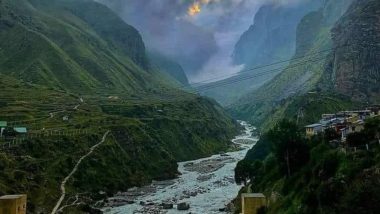Beijing, March 11: China's Parliament on Thursday adopted the 14th Five-Year Plan, the mega blueprint containing billions of dollars worth of projects, including the controversial hydropower project on the Brahmaputra river in Tibet close to the Arunachal Pradesh border over which India has raised concerns.
The National People's Congress (NPC), China's legislature with over 2,000 members mostly drawn from the ruling Communist Party, adopted the 14th Five-Year Plan (2021-2025) for national economic and social development and the long-range objectives through the year 2035, on the last day of its six-day session on Thursday, official media reported.
Attended by Chinese President Xi Jinping, Premier Li Keqiang and other senior leaders, the NPC approved a development blueprint which contains 60 proposals for speeding up China's development. It was passed by the Communist Party of China (CPC) last year. China and India Are Friends, Not Rivals, Need to Create Enabling Condition to Settle Border Dispute, Says Chinese FM Wang Yi.
The 14th Five-Year plan included building the dam on the lower reaches of the Brahmaputra river over which India and Bangladesh, the riparian states, have raised concerns. China has downplayed such anxieties saying it would keep their interests in mind.
As a lower riparian State with considerable established user rights to the waters of the trans-border rivers, the Indian government has consistently conveyed its views and concerns to the Chinese authorities and has urged them to ensure that the interests of downstream States are not harmed by any activities in upstream areas. China Plans to Provide COVID-19 Vaccines to Chinese Abroad, Olympians.
Che Dalha, deputy Communist Party chief of the Tibet Autonomous Region, said during the NPC session that authorities there should “strive to begin construction (of the dam) this year”.
“Comprehensive planning and environmental impact assessments for the project should be approved as soon as possible,” he said last Saturday on the sidelines of the NPC session, Hong Kong-based South China Morning Post quoted a press release from the provincial government in Tibet.













 Quickly
Quickly





















